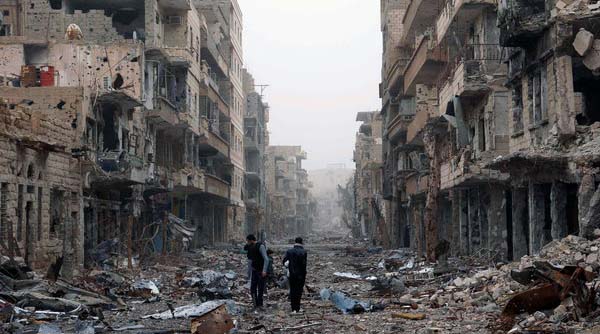In a blunt reaction to global efforts to end almost three years long violence in Syria, 19 rebel groups said in a statement on Sunday that anyone who attended the talks would be committing treason. They said that the proposed Geneva conference was not, nor would it ever be their people’s choice or their revolution’s demand. “Those who attend such talks will be committing treason and would have to answer for it before our courts”.
In response, Russia described the move as outrageous threat by powerful rebel groups in Syria against those who attend peace talks on the conflict backed by Moscow and Washington. Russia’s foreign Minister Sergei Lavrov said in televised comments that it was outrageous that some of those extremist, terrorist organizations fighting government forces in Syria were starting to make threat. “The threats are directed at those who have the courage to attend the proposed Geneva conference being offered by Russia and the United States with the entire world’s support,” he added.
The Geneva conference is indeed the result of robust talks between Russia and the United States. While the US was spearheading to ratchet up pressure or strengthen the military option against Syria, but it was Russia that prevented a possible war with its smart plan. This plan was a victory for Russia’s diplomatic efforts and space for Syria to deal severe blow to prestige of oppositions. In fact, the agreement of Damascus government to destroy all its chemical weapons erased dubious hatred covered his face since the very start of uprising. His stance was further supported by all as the government has acted so transparently and closely cooperated with international community to identify and destroy chemical weapons. Hence, many countries that were pushing for collapse of the Syrian government have moved inches back.
Now many countries, on the top US and Russia, are trying to find a diplomatic solution the thing they were reluctant to. The Geneva conference is part of that broader move. But now oppositions have grown up enough. They are not in weaker positions, developing wide range of supporters in the region. Even it is possible that in that possible conference, the option of discharging President Assad from the next government would remain as strong option meanwhile various rebellion groups are not ready to hold talk. Their only logic is ousting the regime and persecuting all those who stood against them during last two and half years.
With such standings from both sides, many have talked about postponing the talk. But the United Nations Secretary General Ban Ki-moon is still to name a formal date for the proposed meeting.
Two things indeed has complicated the situation there. The first one is the international sharp division, as was noticed before. Despite all know that war is not a solution to Syria and it has only changed a strong Arab country into dusty soil and grave of tens of thousands of people with millions refugees, begging for food. And the second thing is regional rivalry.
In the first case, two times the drafts prepared, once by some western countries and secondly by western countries in alliance with Arab countries, were vetoed by Russia and China on the basis of fearing that Libya scenario should not be repeated in Syrian too. Therefore, it is hardly possible to pass a resolution which paves the way for foreign military intervention.
In the second case, Syria is a country which is a strategic support to regional countries. For Islamic Republic of Iran, Hezbollah of Lebanon, Hamas of Palestine and, perhaps, Iraq current Damascus regime is highly important. While its Arab fellows prefer much to end to the regime of Bashar-al-Assad.
Syria is ruled by Alawis, which is far similar to Shiite religion. And, thus, there are people assessing the relation between Tehran and Damascus due to their religious similarities. No doubt, Iran has tried to be recognized as regional power and has a close relation with Assad’s regime. Therefore, since the start of civil uprising, Tehran has never retreated back from its stance on Syria and links unrest there to western countries propaganda and intervention. Syria has strategic importance to Iran. It provides a safe and secure way to Hezbollah of Lebanon which largely depends on financial and military support of both countries. Losing a friend of such an importance can potentially endanger the stance of Hezbollah and affects the regional status of political and strategic Tehran.
Moreover, in civil uprising, through efforts of the regime, the sectarian line has become revealed more then ever. Alawis have generally kept silence against government violence. This phenomenon has dragged Sunni Arab countries into the country. Saudi Arabia is leading this wing and tries to mount pressure on Assad to yield to protestors demands. Now these two regional wings try their most to get maximum benefits or interest out of current controversies.
Though it is possible that if he steps down, Islamic groups would take power, but that has blurred prospective caused international community to keep their mouth shut. Western countries, on top, US have been criticizing Damascus for severe crackdown of peaceful protestors.
Presently, after the failure of peace plan of Kofi Annan the former chief of United Nations General Secretary, the situation has turned gruesomely dangerous. In the short-term prospective, tension may intensifies. As result, unfortunately, the Arab Spring’s cost increases.

